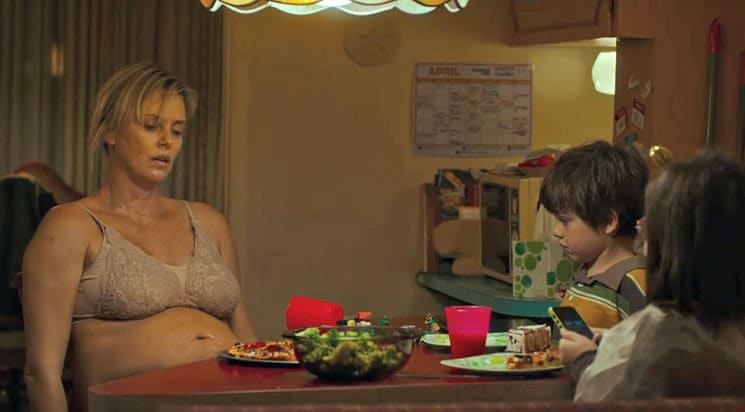How do you solve a problem like Jason Reitman? For more than a decade now, the Canadian director has fancied himself a Jonathan Demme-esque auteur of social realism, all shaggy edges and middle America settings. But where the late Demme was generous and empathetic with his approach to characterization, Reitman has revealed himself to be one of the more boneheaded, socially prescriptive filmmakers working today, and his particularly mean-spirited brand of conservatism comes to a head with his latest film, Tully.
In 2018, years removed from the Juno days, Reitman could sure use a hit. After the back to back failures of Labor Day and Men, Women and Children, Reitman retreats to what worked the last time audiences showed up to one of his movies, teaming up with his Juno and Young Adult screenwriter Diablo Cody, and the latter film's star, Charlize Theron, for a last-ditch stab at relevance. It's all too little, too late, and Reitman really should steer away from making films about the working class, because his best film, 2006's Thank You For Smoking, sidesteps a fact that is becoming clearer and clearer with each film: Jason Reitman hates poor people.
From Juno's hapless depiction of middle class family life, to the terminated employees of Up In The Air, to the small-town horror show of Young Adult, Reitman looks upon the less fortunate as problems to be fixed, who, if they could just pick themselves up by their bootstraps, would be valuable members of society. Indeed, a strong line of conservative politics runs through Reitman's work, instilling messages about traditional family life, social order and the dangers of social media in all of his films. He's Demme by way of latter-day Eastwood.
So what to make of Tully, which some critics have labeled a comeback for Reitman after years in the wilderness? Charlize Theron reliably delivers an excellent turn, despite a clunker of a script. Her performance is perhaps the one bright spot in the film and makes Tully somewhat worth checking out. Theron plays Marlo, a mother of two with a baby on the way. Marlo experienced postpartum depression with the birth of her last child and her husband, played by Ron Livingston, barely lifts a finger around the house. The family is struggling to figure out how to manage financially with Marlo's unexpected pregnancy, along with her son's apparent autism. The film oddly never describes him as autistic, instead having characters say he's "quirky." It's that kind of script.
As Marlo's stresses pile on, her extravagantly wealthy brother, played by Mark Duplass, offers her a solution: he'll hire her a "night nurse" who will arrive after hours and tidy up, taking care of the baby while Marlo rests. She's hesitant at first, but after an incident at her son's school, Marlo follows through with the offer. From there, she meets the titular Tully, a free-spirited 20-something played by Mackenzie Davis, and the script segues into a limp and patronizing look at the differences between generations that borders on a Coca-Cola ad, with nothing to say about the divide between millennials and Gen X'ers.
Likewise, the film's handling of mental illness, particularly through its use of magical realism elements, borders on offensive. Theron does the best with the material she's provided with, but Reitman was not the director to make subtle, respectful choices. The film culminates in an ending that doubles down on everything we'd suffered through prior, culminating in one of the most insufferable twists in recent memory. It's worth seeing just for the sheer audacity Reitman has in pulling a fast one over us, and it's an ending that leaves a bad taste in your mouth days after seeing the film.
(Focus)In 2018, years removed from the Juno days, Reitman could sure use a hit. After the back to back failures of Labor Day and Men, Women and Children, Reitman retreats to what worked the last time audiences showed up to one of his movies, teaming up with his Juno and Young Adult screenwriter Diablo Cody, and the latter film's star, Charlize Theron, for a last-ditch stab at relevance. It's all too little, too late, and Reitman really should steer away from making films about the working class, because his best film, 2006's Thank You For Smoking, sidesteps a fact that is becoming clearer and clearer with each film: Jason Reitman hates poor people.
From Juno's hapless depiction of middle class family life, to the terminated employees of Up In The Air, to the small-town horror show of Young Adult, Reitman looks upon the less fortunate as problems to be fixed, who, if they could just pick themselves up by their bootstraps, would be valuable members of society. Indeed, a strong line of conservative politics runs through Reitman's work, instilling messages about traditional family life, social order and the dangers of social media in all of his films. He's Demme by way of latter-day Eastwood.
So what to make of Tully, which some critics have labeled a comeback for Reitman after years in the wilderness? Charlize Theron reliably delivers an excellent turn, despite a clunker of a script. Her performance is perhaps the one bright spot in the film and makes Tully somewhat worth checking out. Theron plays Marlo, a mother of two with a baby on the way. Marlo experienced postpartum depression with the birth of her last child and her husband, played by Ron Livingston, barely lifts a finger around the house. The family is struggling to figure out how to manage financially with Marlo's unexpected pregnancy, along with her son's apparent autism. The film oddly never describes him as autistic, instead having characters say he's "quirky." It's that kind of script.
As Marlo's stresses pile on, her extravagantly wealthy brother, played by Mark Duplass, offers her a solution: he'll hire her a "night nurse" who will arrive after hours and tidy up, taking care of the baby while Marlo rests. She's hesitant at first, but after an incident at her son's school, Marlo follows through with the offer. From there, she meets the titular Tully, a free-spirited 20-something played by Mackenzie Davis, and the script segues into a limp and patronizing look at the differences between generations that borders on a Coca-Cola ad, with nothing to say about the divide between millennials and Gen X'ers.
Likewise, the film's handling of mental illness, particularly through its use of magical realism elements, borders on offensive. Theron does the best with the material she's provided with, but Reitman was not the director to make subtle, respectful choices. The film culminates in an ending that doubles down on everything we'd suffered through prior, culminating in one of the most insufferable twists in recent memory. It's worth seeing just for the sheer audacity Reitman has in pulling a fast one over us, and it's an ending that leaves a bad taste in your mouth days after seeing the film.




